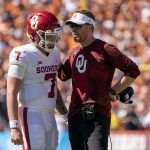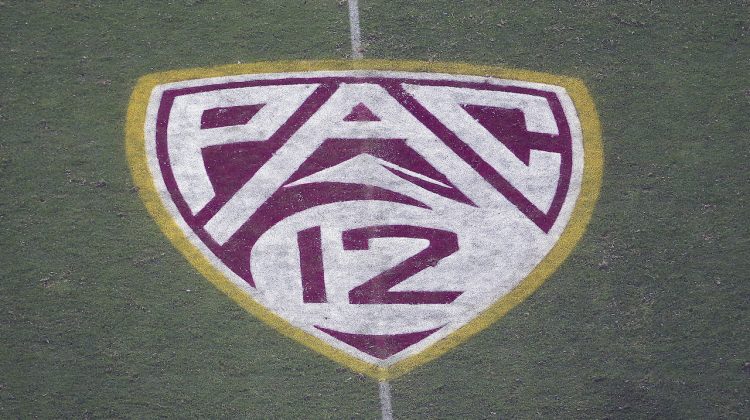Details of the Pac-12’s media rights negotiations have been hidden from view for the better part of 10 months, with no issue more mysterious than the extended time frame. Even a handful of university presidents expected the process to have wrapped up earlier this spring.
Now, it appears the saga could last into the summer.
Why the delay? One of those very same presidents has offered crucial insight.
“I think it’s just the environment,” Washington State’s Kirk Schulz said this week. “It’s the uncertainty in the economy, the layoffs in the tech sector and other places.
“I know at least one of the partners we were talking to said, ‘We’re ready to sign today, but the optics of us announcing that we’re laying off X number of people and we signed a multimillion dollar deal with the Pac-12 are just not the best, so we’re going to have to wait six weeks.’
“Clearly, the optics are something those folks are really worried about.”
Schulz’s comments came during a wide-ranging conversation about college athletics with WSU regent (and retired journalist) Enrique Cerna that was published by the university on YouTube.
He became the first Pac-12 president to offer a specific explanation for the delay following months of rumors and whispers about the holdup.
His comments suggest the conference is deep in negotiations with either ESPN or Amazon, if not both. Why? Because ESPN is undergoing several rounds of layoffs as part of cost-cutting moves by its parent company, Disney, and Amazon announced recently that it would eliminate 9,000 jobs this spring.
(A third media company believed to be negotiating with the conference, Apple, has not announced mass layoffs thus far.)
“If you said when would be the worst time in the last six years to try and negotiate a media deal,” Schulz told Cerna, “probably the last five months is pretty close to the worst.”
The delay caused by economic factors underscores the role timing plays in media rights negotiations.
The Big 12 opted to renew its distribution agreements with Fox and ESPN last fall as commissioner Brett Yormark and the university presidents favored the security of a deal in hand over waiting for the conference’s natural negotiating window — and the possibility of a higher valuation — in the spring of 2024.
In contrast, the Pac-12 passed on the chance to renew its agreements with ESPN and Fox last fall and took its inventory to the marketplace.
That left the conference vulnerable to economic forces but also created an opportunity: No other Power Five league has media rights available until 2030.
Will the supply-demand advantage trump the economic downturn?
Does the conference have enough premium inventory to drive the valuation past the Big 12’s number ($31.7 million per school per year)?
And will the risks of a delay lead to presidential panic and wandering eyes?
That’s all to be determined in the coming weeks and months.
Like many of his Pac-12 peers, Schulz expressed confidence in the trajectory of the negotiations.
“We’ve continued to have those conversations with recognizable major media outlets,” he said. “They are very interested in the Pac-12. People have to remember … we occupy a coveted time slot (7:30 p.m. Pacific) where people need live sports content.
“People like college football, and the Pac-12 owns that West Coast time frame, and so that’s why all the people are really interested in it.
“They have a big slot they want to fill it with games people want to sit and watch, with recognizable teams. And we’re going to be able to do that.”
Schulz, a member of the Pac-12’s executive committee, added that the deal is expected to feature “multiple media companies” with distribution on both linear and streaming platforms.
He echoed a sentiment heard often across the conference footprint — that fans are deeply frustrated by the Pac-12 Networks and covet the ability to watch games from anywhere at any time.
“Our conversations are going well,” he added. “But at the end of the day, if I’m a fan, I’m skeptical until you say, ‘Kirk, make an announcement, tell me the dollar figure, tell me everybody’s signing the grant of rights, and then I’ll leave you alone.’
“Until we get that done, and I expect that to be this summer, there’s going to continue to be this speculation out there about what’s going to happen.”
Attachments area
Preview YouTube video Beyond the Field with WSU President Kirk Schulz and Enrique Cerna
Related posts:
 Wilner Hotline – Thanksgiving Day Pac-12 Doings
Wilner Hotline – Thanksgiving Day Pac-12 Doings

Oklahoma head coach Lincoln Riley . (AP Photo/Jeffrey McWhorter)
Wilner Hotline – Lincoln Riley To USC Sends Shock Waves Through Pac-12
UCLA guard Jaime Jaquez Jr. (24)(AP Photo/José Luis Villegas)
A quiet NBA Draft awaits the Pac-12, which speaks volumes about the state of the conference Pac-12 survival: Time for commissioner George Kliavkoff and the presidents to take swift, bold action (i.e., the “Costanza plan”)
Pac-12 survival: Time for commissioner George Kliavkoff and the presidents to take swift, bold action (i.e., the “Costanza plan”)

